Importance of Advanced Empathy and Skills Used in Counselling
VerifiedAdded on 2023/06/12
|8
|2282
|162
AI Summary
This essay discusses the importance of advanced empathy and skills used in counselling. It covers topics such as the distinction between empathy and advanced empathy, skills used in counselling, and more.
Contribute Materials
Your contribution can guide someone’s learning journey. Share your
documents today.
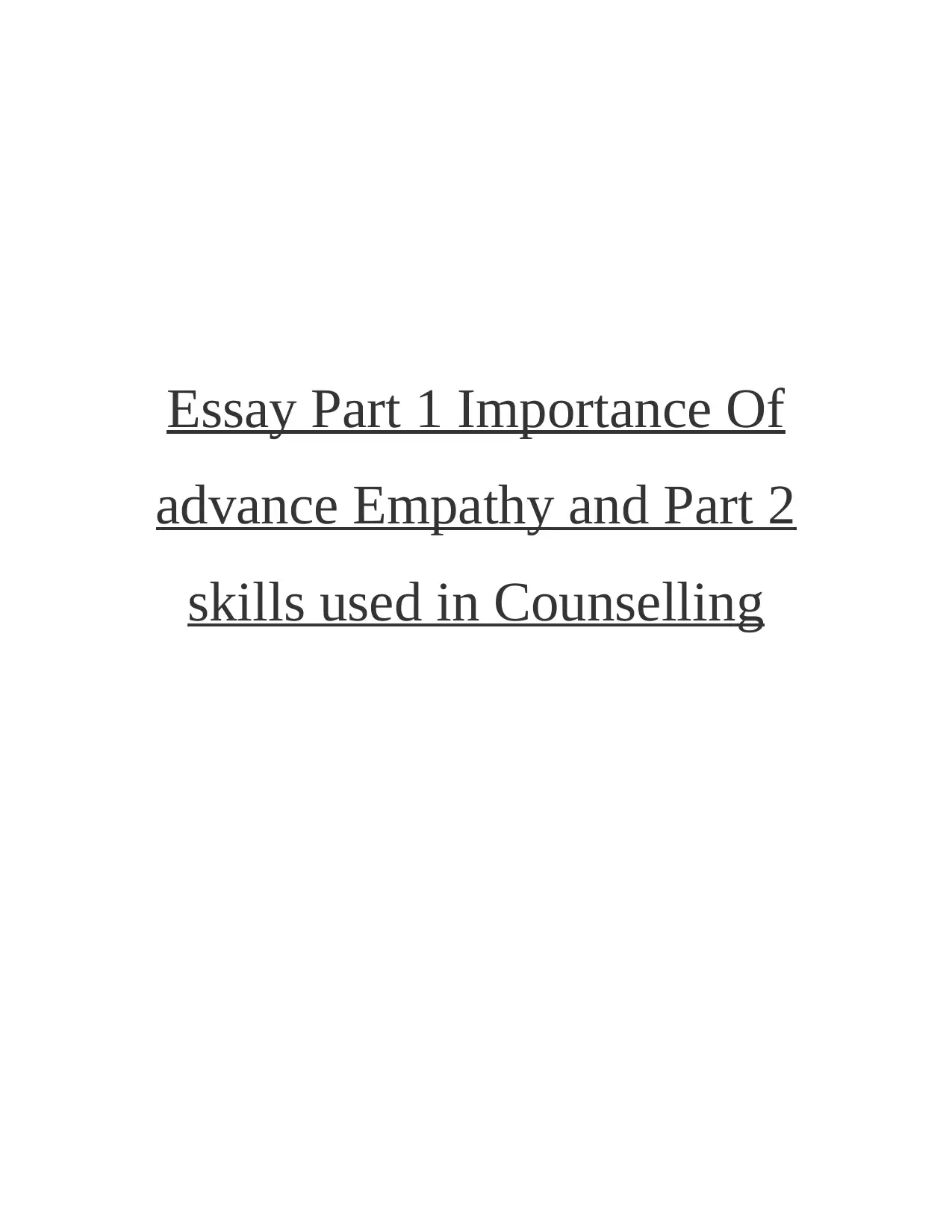
Essay Part 1 Importance Of
advance Empathy and Part 2
skills used in Counselling
advance Empathy and Part 2
skills used in Counselling
Secure Best Marks with AI Grader
Need help grading? Try our AI Grader for instant feedback on your assignments.
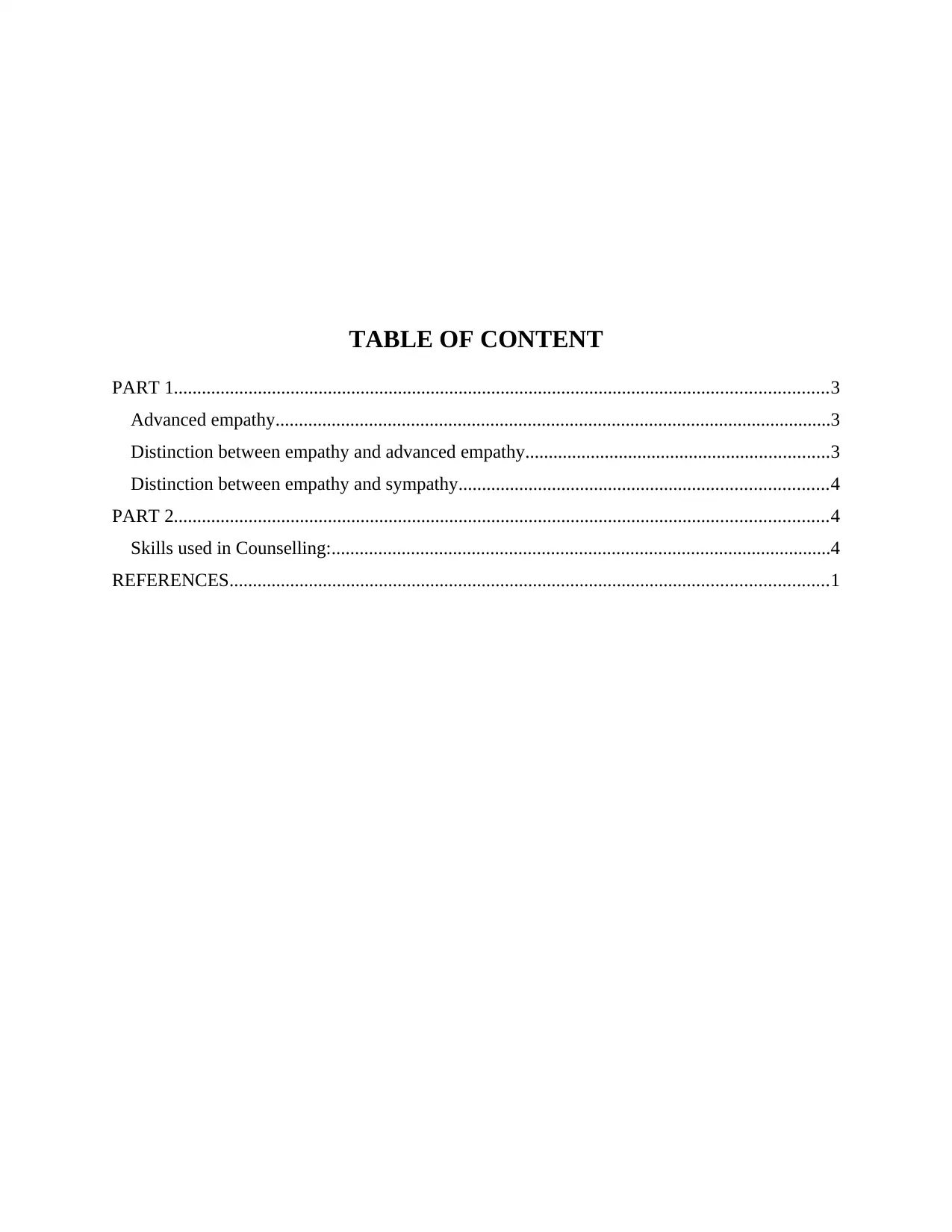
TABLE OF CONTENT
PART 1............................................................................................................................................3
Advanced empathy.......................................................................................................................3
Distinction between empathy and advanced empathy.................................................................3
Distinction between empathy and sympathy...............................................................................4
PART 2............................................................................................................................................4
Skills used in Counselling:...........................................................................................................4
REFERENCES................................................................................................................................1
PART 1............................................................................................................................................3
Advanced empathy.......................................................................................................................3
Distinction between empathy and advanced empathy.................................................................3
Distinction between empathy and sympathy...............................................................................4
PART 2............................................................................................................................................4
Skills used in Counselling:...........................................................................................................4
REFERENCES................................................................................................................................1
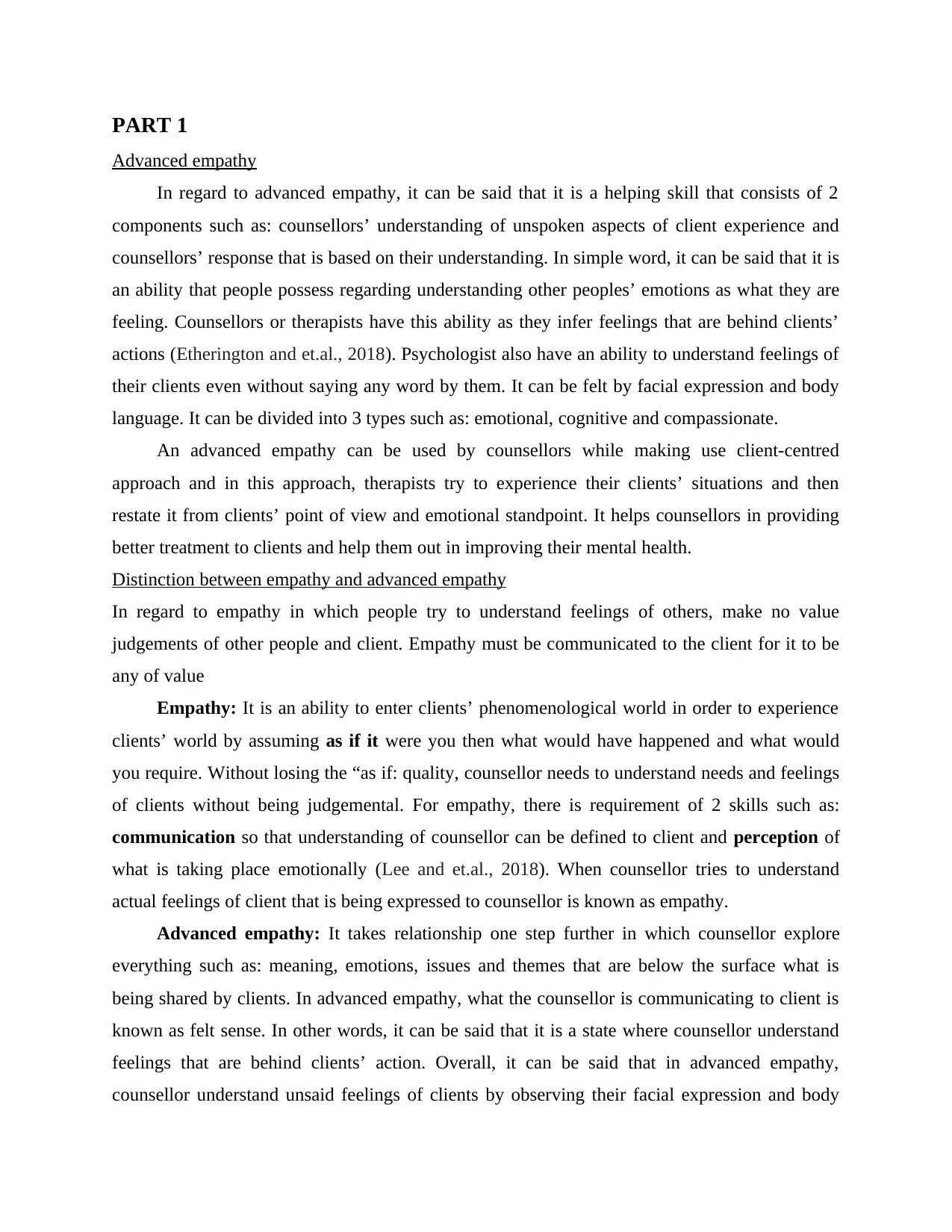
PART 1
Advanced empathy
In regard to advanced empathy, it can be said that it is a helping skill that consists of 2
components such as: counsellors’ understanding of unspoken aspects of client experience and
counsellors’ response that is based on their understanding. In simple word, it can be said that it is
an ability that people possess regarding understanding other peoples’ emotions as what they are
feeling. Counsellors or therapists have this ability as they infer feelings that are behind clients’
actions (Etherington and et.al., 2018). Psychologist also have an ability to understand feelings of
their clients even without saying any word by them. It can be felt by facial expression and body
language. It can be divided into 3 types such as: emotional, cognitive and compassionate.
An advanced empathy can be used by counsellors while making use client-centred
approach and in this approach, therapists try to experience their clients’ situations and then
restate it from clients’ point of view and emotional standpoint. It helps counsellors in providing
better treatment to clients and help them out in improving their mental health.
Distinction between empathy and advanced empathy
In regard to empathy in which people try to understand feelings of others, make no value
judgements of other people and client. Empathy must be communicated to the client for it to be
any of value
Empathy: It is an ability to enter clients’ phenomenological world in order to experience
clients’ world by assuming as if it were you then what would have happened and what would
you require. Without losing the “as if: quality, counsellor needs to understand needs and feelings
of clients without being judgemental. For empathy, there is requirement of 2 skills such as:
communication so that understanding of counsellor can be defined to client and perception of
what is taking place emotionally (Lee and et.al., 2018). When counsellor tries to understand
actual feelings of client that is being expressed to counsellor is known as empathy.
Advanced empathy: It takes relationship one step further in which counsellor explore
everything such as: meaning, emotions, issues and themes that are below the surface what is
being shared by clients. In advanced empathy, what the counsellor is communicating to client is
known as felt sense. In other words, it can be said that it is a state where counsellor understand
feelings that are behind clients’ action. Overall, it can be said that in advanced empathy,
counsellor understand unsaid feelings of clients by observing their facial expression and body
Advanced empathy
In regard to advanced empathy, it can be said that it is a helping skill that consists of 2
components such as: counsellors’ understanding of unspoken aspects of client experience and
counsellors’ response that is based on their understanding. In simple word, it can be said that it is
an ability that people possess regarding understanding other peoples’ emotions as what they are
feeling. Counsellors or therapists have this ability as they infer feelings that are behind clients’
actions (Etherington and et.al., 2018). Psychologist also have an ability to understand feelings of
their clients even without saying any word by them. It can be felt by facial expression and body
language. It can be divided into 3 types such as: emotional, cognitive and compassionate.
An advanced empathy can be used by counsellors while making use client-centred
approach and in this approach, therapists try to experience their clients’ situations and then
restate it from clients’ point of view and emotional standpoint. It helps counsellors in providing
better treatment to clients and help them out in improving their mental health.
Distinction between empathy and advanced empathy
In regard to empathy in which people try to understand feelings of others, make no value
judgements of other people and client. Empathy must be communicated to the client for it to be
any of value
Empathy: It is an ability to enter clients’ phenomenological world in order to experience
clients’ world by assuming as if it were you then what would have happened and what would
you require. Without losing the “as if: quality, counsellor needs to understand needs and feelings
of clients without being judgemental. For empathy, there is requirement of 2 skills such as:
communication so that understanding of counsellor can be defined to client and perception of
what is taking place emotionally (Lee and et.al., 2018). When counsellor tries to understand
actual feelings of client that is being expressed to counsellor is known as empathy.
Advanced empathy: It takes relationship one step further in which counsellor explore
everything such as: meaning, emotions, issues and themes that are below the surface what is
being shared by clients. In advanced empathy, what the counsellor is communicating to client is
known as felt sense. In other words, it can be said that it is a state where counsellor understand
feelings that are behind clients’ action. Overall, it can be said that in advanced empathy,
counsellor understand unsaid feelings of clients by observing their facial expression and body
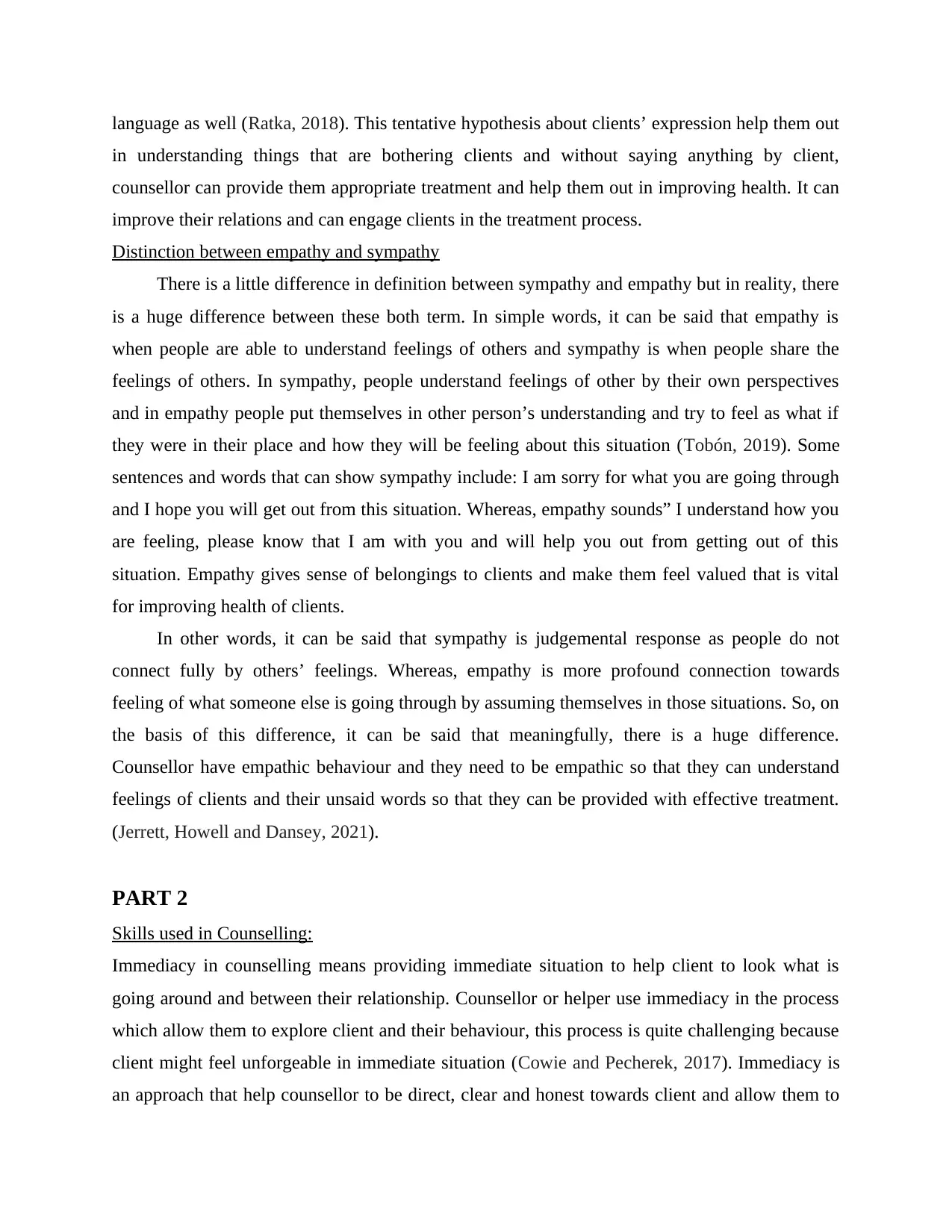
language as well (Ratka, 2018). This tentative hypothesis about clients’ expression help them out
in understanding things that are bothering clients and without saying anything by client,
counsellor can provide them appropriate treatment and help them out in improving health. It can
improve their relations and can engage clients in the treatment process.
Distinction between empathy and sympathy
There is a little difference in definition between sympathy and empathy but in reality, there
is a huge difference between these both term. In simple words, it can be said that empathy is
when people are able to understand feelings of others and sympathy is when people share the
feelings of others. In sympathy, people understand feelings of other by their own perspectives
and in empathy people put themselves in other person’s understanding and try to feel as what if
they were in their place and how they will be feeling about this situation (Tobón, 2019). Some
sentences and words that can show sympathy include: I am sorry for what you are going through
and I hope you will get out from this situation. Whereas, empathy sounds” I understand how you
are feeling, please know that I am with you and will help you out from getting out of this
situation. Empathy gives sense of belongings to clients and make them feel valued that is vital
for improving health of clients.
In other words, it can be said that sympathy is judgemental response as people do not
connect fully by others’ feelings. Whereas, empathy is more profound connection towards
feeling of what someone else is going through by assuming themselves in those situations. So, on
the basis of this difference, it can be said that meaningfully, there is a huge difference.
Counsellor have empathic behaviour and they need to be empathic so that they can understand
feelings of clients and their unsaid words so that they can be provided with effective treatment.
(Jerrett, Howell and Dansey, 2021).
PART 2
Skills used in Counselling:
Immediacy in counselling means providing immediate situation to help client to look what is
going around and between their relationship. Counsellor or helper use immediacy in the process
which allow them to explore client and their behaviour, this process is quite challenging because
client might feel unforgeable in immediate situation (Cowie and Pecherek, 2017). Immediacy is
an approach that help counsellor to be direct, clear and honest towards client and allow them to
in understanding things that are bothering clients and without saying anything by client,
counsellor can provide them appropriate treatment and help them out in improving health. It can
improve their relations and can engage clients in the treatment process.
Distinction between empathy and sympathy
There is a little difference in definition between sympathy and empathy but in reality, there
is a huge difference between these both term. In simple words, it can be said that empathy is
when people are able to understand feelings of others and sympathy is when people share the
feelings of others. In sympathy, people understand feelings of other by their own perspectives
and in empathy people put themselves in other person’s understanding and try to feel as what if
they were in their place and how they will be feeling about this situation (Tobón, 2019). Some
sentences and words that can show sympathy include: I am sorry for what you are going through
and I hope you will get out from this situation. Whereas, empathy sounds” I understand how you
are feeling, please know that I am with you and will help you out from getting out of this
situation. Empathy gives sense of belongings to clients and make them feel valued that is vital
for improving health of clients.
In other words, it can be said that sympathy is judgemental response as people do not
connect fully by others’ feelings. Whereas, empathy is more profound connection towards
feeling of what someone else is going through by assuming themselves in those situations. So, on
the basis of this difference, it can be said that meaningfully, there is a huge difference.
Counsellor have empathic behaviour and they need to be empathic so that they can understand
feelings of clients and their unsaid words so that they can be provided with effective treatment.
(Jerrett, Howell and Dansey, 2021).
PART 2
Skills used in Counselling:
Immediacy in counselling means providing immediate situation to help client to look what is
going around and between their relationship. Counsellor or helper use immediacy in the process
which allow them to explore client and their behaviour, this process is quite challenging because
client might feel unforgeable in immediate situation (Cowie and Pecherek, 2017). Immediacy is
an approach that help counsellor to be direct, clear and honest towards client and allow them to
Secure Best Marks with AI Grader
Need help grading? Try our AI Grader for instant feedback on your assignments.
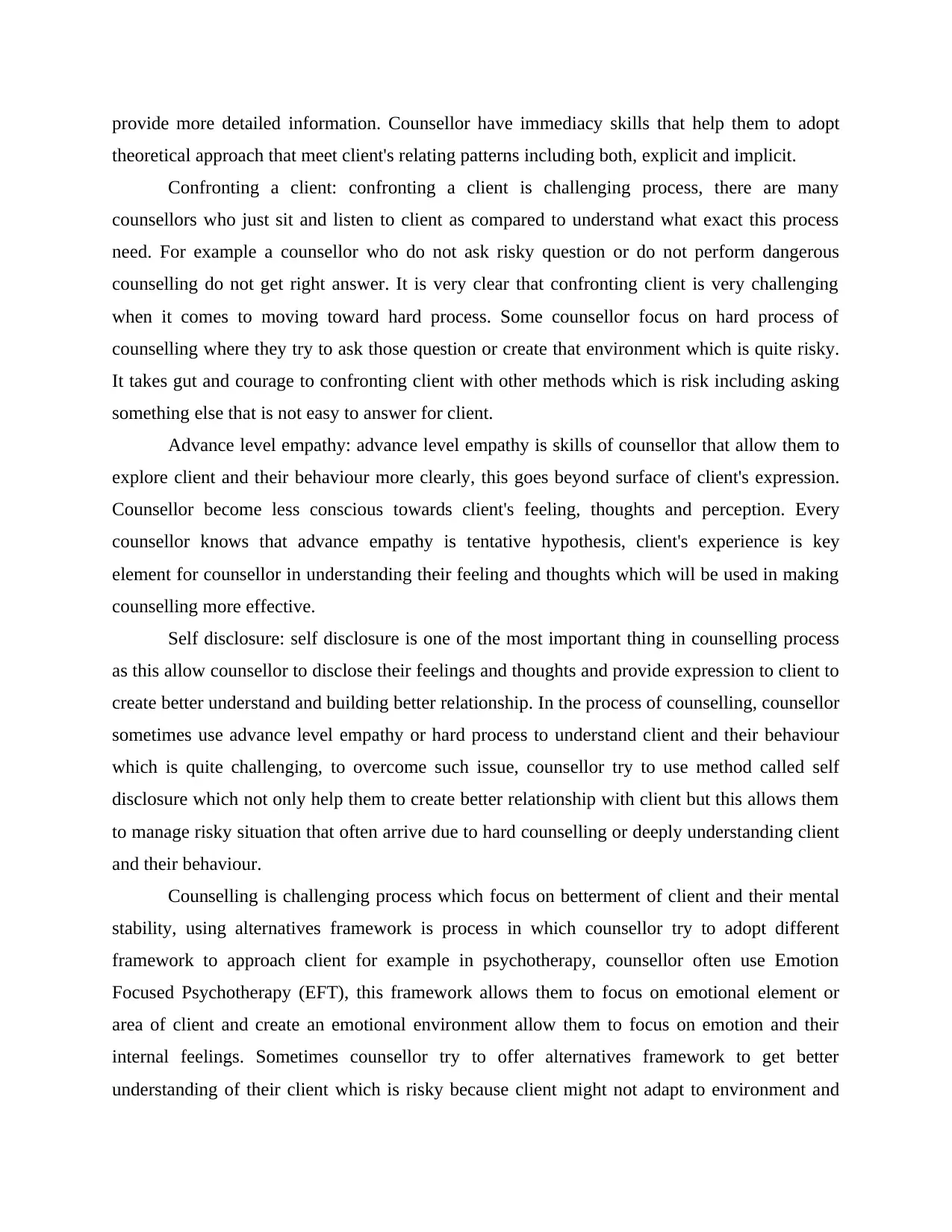
provide more detailed information. Counsellor have immediacy skills that help them to adopt
theoretical approach that meet client's relating patterns including both, explicit and implicit.
Confronting a client: confronting a client is challenging process, there are many
counsellors who just sit and listen to client as compared to understand what exact this process
need. For example a counsellor who do not ask risky question or do not perform dangerous
counselling do not get right answer. It is very clear that confronting client is very challenging
when it comes to moving toward hard process. Some counsellor focus on hard process of
counselling where they try to ask those question or create that environment which is quite risky.
It takes gut and courage to confronting client with other methods which is risk including asking
something else that is not easy to answer for client.
Advance level empathy: advance level empathy is skills of counsellor that allow them to
explore client and their behaviour more clearly, this goes beyond surface of client's expression.
Counsellor become less conscious towards client's feeling, thoughts and perception. Every
counsellor knows that advance empathy is tentative hypothesis, client's experience is key
element for counsellor in understanding their feeling and thoughts which will be used in making
counselling more effective.
Self disclosure: self disclosure is one of the most important thing in counselling process
as this allow counsellor to disclose their feelings and thoughts and provide expression to client to
create better understand and building better relationship. In the process of counselling, counsellor
sometimes use advance level empathy or hard process to understand client and their behaviour
which is quite challenging, to overcome such issue, counsellor try to use method called self
disclosure which not only help them to create better relationship with client but this allows them
to manage risky situation that often arrive due to hard counselling or deeply understanding client
and their behaviour.
Counselling is challenging process which focus on betterment of client and their mental
stability, using alternatives framework is process in which counsellor try to adopt different
framework to approach client for example in psychotherapy, counsellor often use Emotion
Focused Psychotherapy (EFT), this framework allows them to focus on emotional element or
area of client and create an emotional environment allow them to focus on emotion and their
internal feelings. Sometimes counsellor try to offer alternatives framework to get better
understanding of their client which is risky because client might not adapt to environment and
theoretical approach that meet client's relating patterns including both, explicit and implicit.
Confronting a client: confronting a client is challenging process, there are many
counsellors who just sit and listen to client as compared to understand what exact this process
need. For example a counsellor who do not ask risky question or do not perform dangerous
counselling do not get right answer. It is very clear that confronting client is very challenging
when it comes to moving toward hard process. Some counsellor focus on hard process of
counselling where they try to ask those question or create that environment which is quite risky.
It takes gut and courage to confronting client with other methods which is risk including asking
something else that is not easy to answer for client.
Advance level empathy: advance level empathy is skills of counsellor that allow them to
explore client and their behaviour more clearly, this goes beyond surface of client's expression.
Counsellor become less conscious towards client's feeling, thoughts and perception. Every
counsellor knows that advance empathy is tentative hypothesis, client's experience is key
element for counsellor in understanding their feeling and thoughts which will be used in making
counselling more effective.
Self disclosure: self disclosure is one of the most important thing in counselling process
as this allow counsellor to disclose their feelings and thoughts and provide expression to client to
create better understand and building better relationship. In the process of counselling, counsellor
sometimes use advance level empathy or hard process to understand client and their behaviour
which is quite challenging, to overcome such issue, counsellor try to use method called self
disclosure which not only help them to create better relationship with client but this allows them
to manage risky situation that often arrive due to hard counselling or deeply understanding client
and their behaviour.
Counselling is challenging process which focus on betterment of client and their mental
stability, using alternatives framework is process in which counsellor try to adopt different
framework to approach client for example in psychotherapy, counsellor often use Emotion
Focused Psychotherapy (EFT), this framework allows them to focus on emotional element or
area of client and create an emotional environment allow them to focus on emotion and their
internal feelings. Sometimes counsellor try to offer alternatives framework to get better
understanding of their client which is risky because client might not adapt to environment and
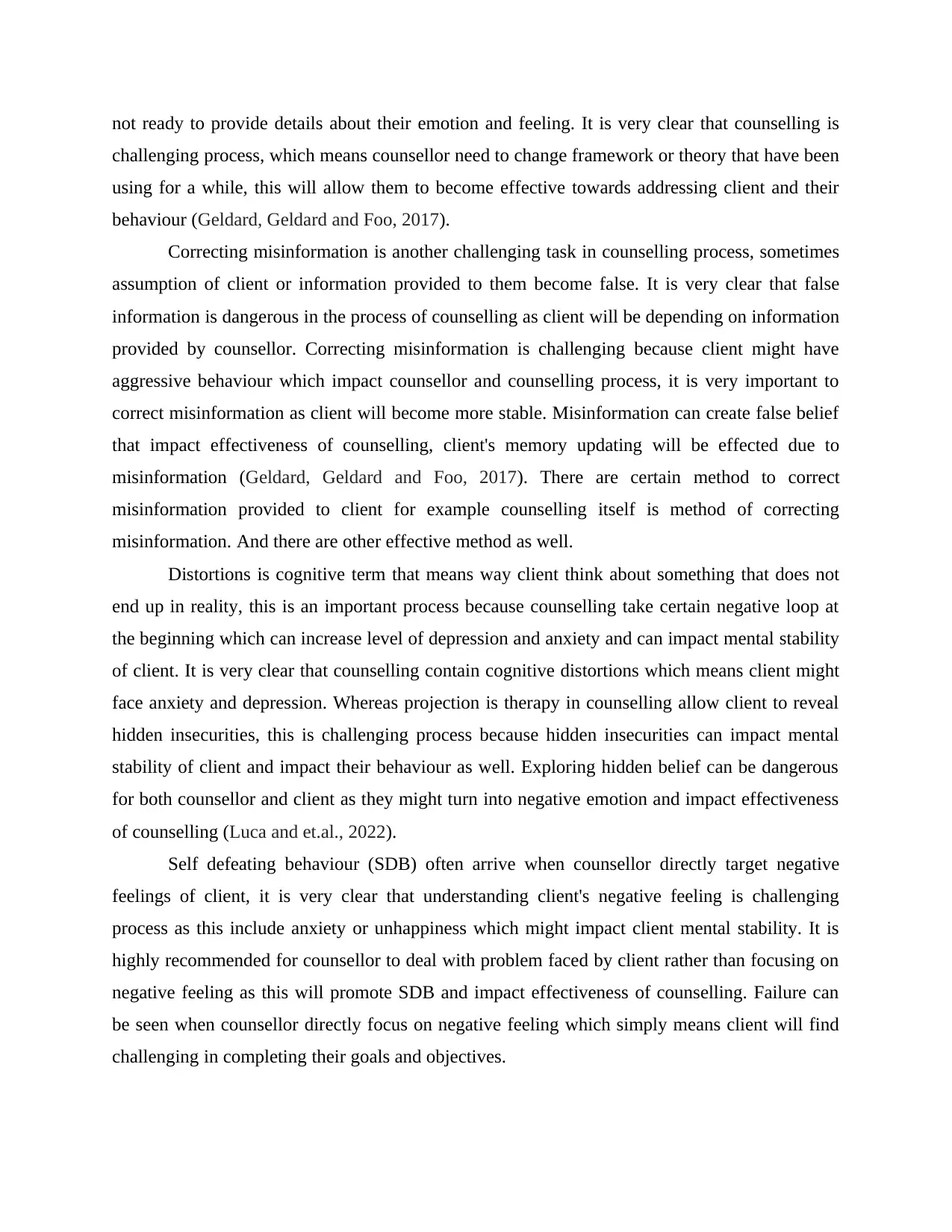
not ready to provide details about their emotion and feeling. It is very clear that counselling is
challenging process, which means counsellor need to change framework or theory that have been
using for a while, this will allow them to become effective towards addressing client and their
behaviour (Geldard, Geldard and Foo, 2017).
Correcting misinformation is another challenging task in counselling process, sometimes
assumption of client or information provided to them become false. It is very clear that false
information is dangerous in the process of counselling as client will be depending on information
provided by counsellor. Correcting misinformation is challenging because client might have
aggressive behaviour which impact counsellor and counselling process, it is very important to
correct misinformation as client will become more stable. Misinformation can create false belief
that impact effectiveness of counselling, client's memory updating will be effected due to
misinformation (Geldard, Geldard and Foo, 2017). There are certain method to correct
misinformation provided to client for example counselling itself is method of correcting
misinformation. And there are other effective method as well.
Distortions is cognitive term that means way client think about something that does not
end up in reality, this is an important process because counselling take certain negative loop at
the beginning which can increase level of depression and anxiety and can impact mental stability
of client. It is very clear that counselling contain cognitive distortions which means client might
face anxiety and depression. Whereas projection is therapy in counselling allow client to reveal
hidden insecurities, this is challenging process because hidden insecurities can impact mental
stability of client and impact their behaviour as well. Exploring hidden belief can be dangerous
for both counsellor and client as they might turn into negative emotion and impact effectiveness
of counselling (Luca and et.al., 2022).
Self defeating behaviour (SDB) often arrive when counsellor directly target negative
feelings of client, it is very clear that understanding client's negative feeling is challenging
process as this include anxiety or unhappiness which might impact client mental stability. It is
highly recommended for counsellor to deal with problem faced by client rather than focusing on
negative feeling as this will promote SDB and impact effectiveness of counselling. Failure can
be seen when counsellor directly focus on negative feeling which simply means client will find
challenging in completing their goals and objectives.
challenging process, which means counsellor need to change framework or theory that have been
using for a while, this will allow them to become effective towards addressing client and their
behaviour (Geldard, Geldard and Foo, 2017).
Correcting misinformation is another challenging task in counselling process, sometimes
assumption of client or information provided to them become false. It is very clear that false
information is dangerous in the process of counselling as client will be depending on information
provided by counsellor. Correcting misinformation is challenging because client might have
aggressive behaviour which impact counsellor and counselling process, it is very important to
correct misinformation as client will become more stable. Misinformation can create false belief
that impact effectiveness of counselling, client's memory updating will be effected due to
misinformation (Geldard, Geldard and Foo, 2017). There are certain method to correct
misinformation provided to client for example counselling itself is method of correcting
misinformation. And there are other effective method as well.
Distortions is cognitive term that means way client think about something that does not
end up in reality, this is an important process because counselling take certain negative loop at
the beginning which can increase level of depression and anxiety and can impact mental stability
of client. It is very clear that counselling contain cognitive distortions which means client might
face anxiety and depression. Whereas projection is therapy in counselling allow client to reveal
hidden insecurities, this is challenging process because hidden insecurities can impact mental
stability of client and impact their behaviour as well. Exploring hidden belief can be dangerous
for both counsellor and client as they might turn into negative emotion and impact effectiveness
of counselling (Luca and et.al., 2022).
Self defeating behaviour (SDB) often arrive when counsellor directly target negative
feelings of client, it is very clear that understanding client's negative feeling is challenging
process as this include anxiety or unhappiness which might impact client mental stability. It is
highly recommended for counsellor to deal with problem faced by client rather than focusing on
negative feeling as this will promote SDB and impact effectiveness of counselling. Failure can
be seen when counsellor directly focus on negative feeling which simply means client will find
challenging in completing their goals and objectives.
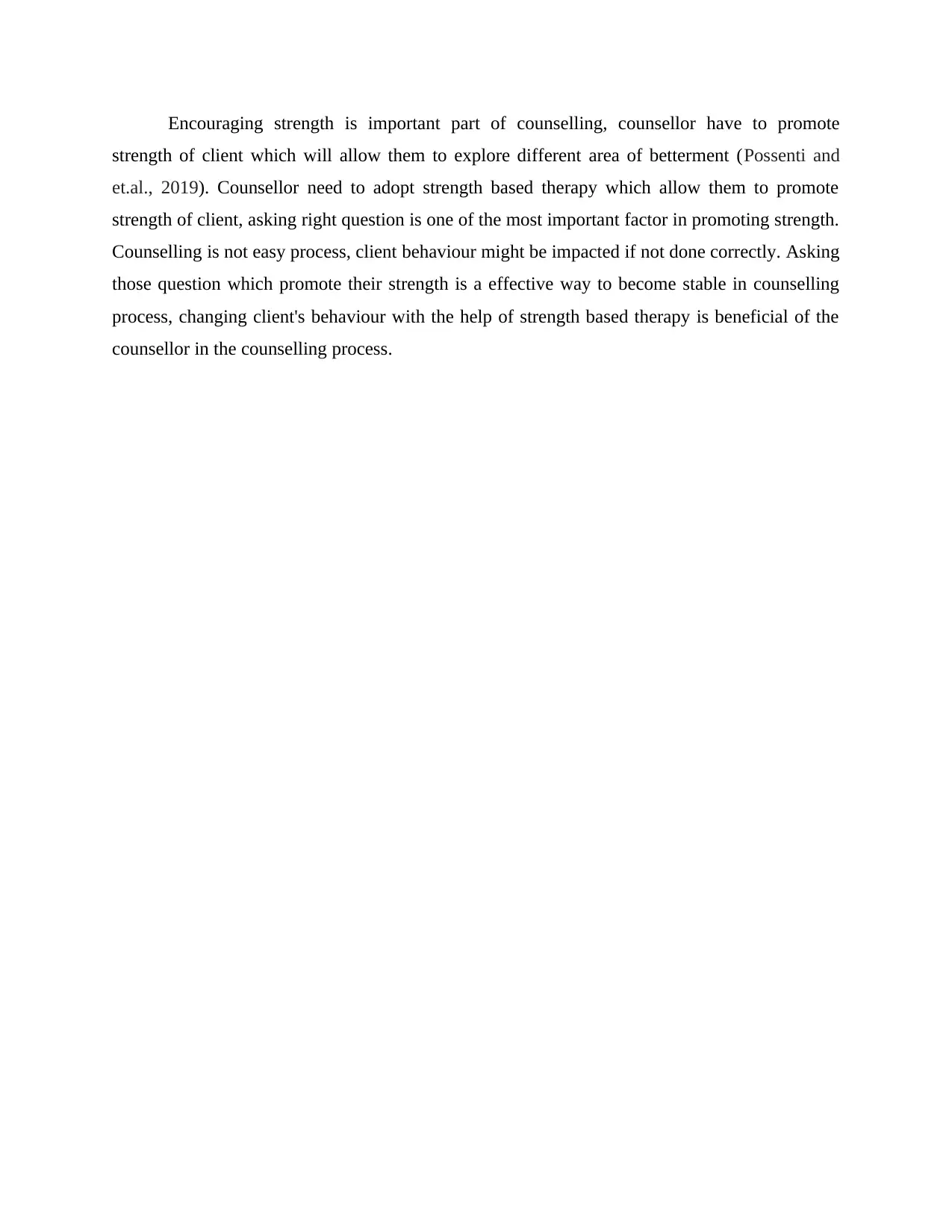
Encouraging strength is important part of counselling, counsellor have to promote
strength of client which will allow them to explore different area of betterment (Possenti and
et.al., 2019). Counsellor need to adopt strength based therapy which allow them to promote
strength of client, asking right question is one of the most important factor in promoting strength.
Counselling is not easy process, client behaviour might be impacted if not done correctly. Asking
those question which promote their strength is a effective way to become stable in counselling
process, changing client's behaviour with the help of strength based therapy is beneficial of the
counsellor in the counselling process.
strength of client which will allow them to explore different area of betterment (Possenti and
et.al., 2019). Counsellor need to adopt strength based therapy which allow them to promote
strength of client, asking right question is one of the most important factor in promoting strength.
Counselling is not easy process, client behaviour might be impacted if not done correctly. Asking
those question which promote their strength is a effective way to become stable in counselling
process, changing client's behaviour with the help of strength based therapy is beneficial of the
counsellor in the counselling process.
Paraphrase This Document
Need a fresh take? Get an instant paraphrase of this document with our AI Paraphraser
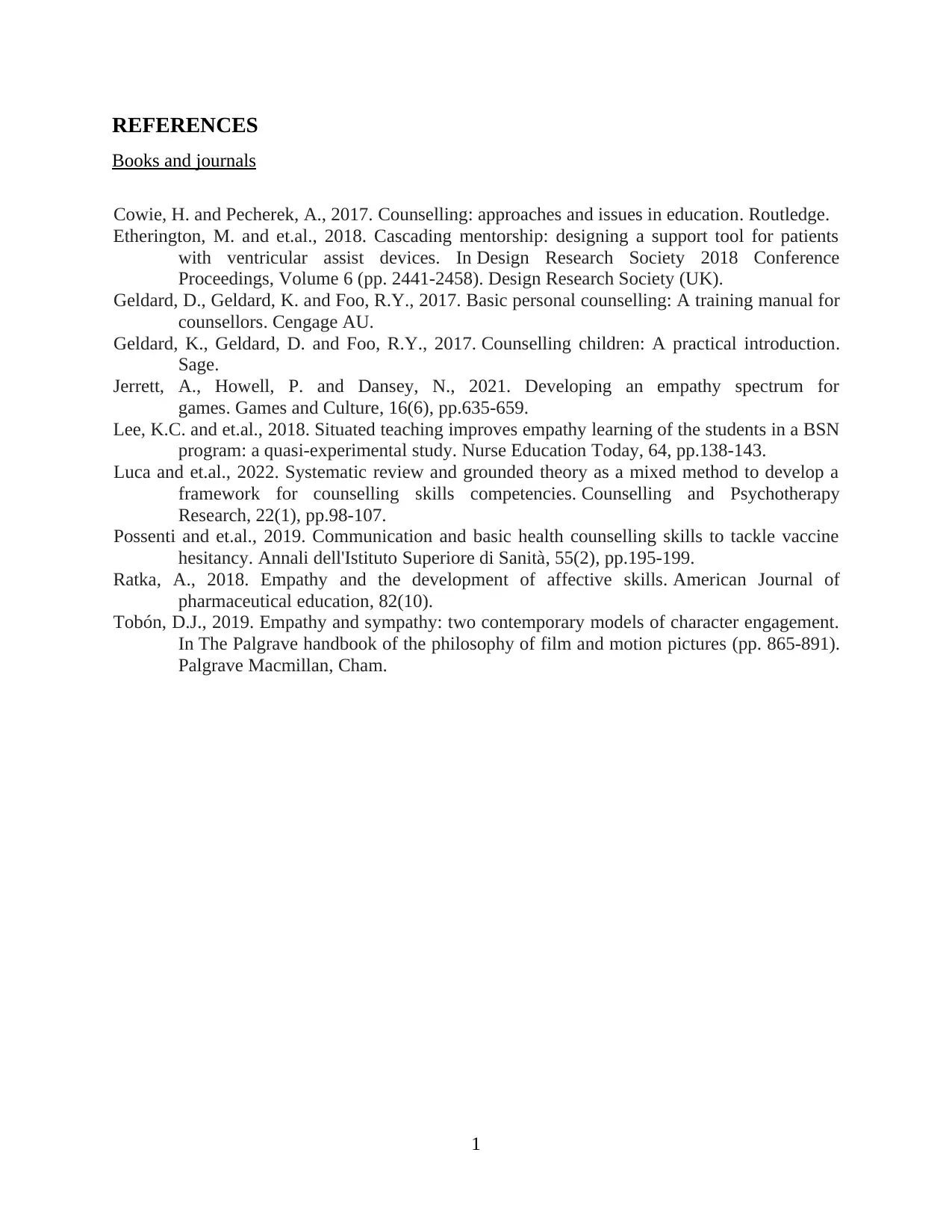
REFERENCES
Books and journals
Cowie, H. and Pecherek, A., 2017. Counselling: approaches and issues in education. Routledge.
Etherington, M. and et.al., 2018. Cascading mentorship: designing a support tool for patients
with ventricular assist devices. In Design Research Society 2018 Conference
Proceedings, Volume 6 (pp. 2441-2458). Design Research Society (UK).
Geldard, D., Geldard, K. and Foo, R.Y., 2017. Basic personal counselling: A training manual for
counsellors. Cengage AU.
Geldard, K., Geldard, D. and Foo, R.Y., 2017. Counselling children: A practical introduction.
Sage.
Jerrett, A., Howell, P. and Dansey, N., 2021. Developing an empathy spectrum for
games. Games and Culture, 16(6), pp.635-659.
Lee, K.C. and et.al., 2018. Situated teaching improves empathy learning of the students in a BSN
program: a quasi-experimental study. Nurse Education Today, 64, pp.138-143.
Luca and et.al., 2022. Systematic review and grounded theory as a mixed method to develop a
framework for counselling skills competencies. Counselling and Psychotherapy
Research, 22(1), pp.98-107.
Possenti and et.al., 2019. Communication and basic health counselling skills to tackle vaccine
hesitancy. Annali dell'Istituto Superiore di Sanità, 55(2), pp.195-199.
Ratka, A., 2018. Empathy and the development of affective skills. American Journal of
pharmaceutical education, 82(10).
Tobón, D.J., 2019. Empathy and sympathy: two contemporary models of character engagement.
In The Palgrave handbook of the philosophy of film and motion pictures (pp. 865-891).
Palgrave Macmillan, Cham.
1
Books and journals
Cowie, H. and Pecherek, A., 2017. Counselling: approaches and issues in education. Routledge.
Etherington, M. and et.al., 2018. Cascading mentorship: designing a support tool for patients
with ventricular assist devices. In Design Research Society 2018 Conference
Proceedings, Volume 6 (pp. 2441-2458). Design Research Society (UK).
Geldard, D., Geldard, K. and Foo, R.Y., 2017. Basic personal counselling: A training manual for
counsellors. Cengage AU.
Geldard, K., Geldard, D. and Foo, R.Y., 2017. Counselling children: A practical introduction.
Sage.
Jerrett, A., Howell, P. and Dansey, N., 2021. Developing an empathy spectrum for
games. Games and Culture, 16(6), pp.635-659.
Lee, K.C. and et.al., 2018. Situated teaching improves empathy learning of the students in a BSN
program: a quasi-experimental study. Nurse Education Today, 64, pp.138-143.
Luca and et.al., 2022. Systematic review and grounded theory as a mixed method to develop a
framework for counselling skills competencies. Counselling and Psychotherapy
Research, 22(1), pp.98-107.
Possenti and et.al., 2019. Communication and basic health counselling skills to tackle vaccine
hesitancy. Annali dell'Istituto Superiore di Sanità, 55(2), pp.195-199.
Ratka, A., 2018. Empathy and the development of affective skills. American Journal of
pharmaceutical education, 82(10).
Tobón, D.J., 2019. Empathy and sympathy: two contemporary models of character engagement.
In The Palgrave handbook of the philosophy of film and motion pictures (pp. 865-891).
Palgrave Macmillan, Cham.
1
1 out of 8
Related Documents
Your All-in-One AI-Powered Toolkit for Academic Success.
+13062052269
info@desklib.com
Available 24*7 on WhatsApp / Email
![[object Object]](/_next/static/media/star-bottom.7253800d.svg)
Unlock your academic potential
© 2024 | Zucol Services PVT LTD | All rights reserved.





